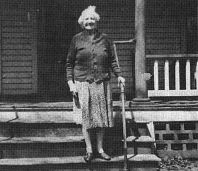
Click Here to Return to Milestones

"The goblins will get you if you don't watch out" once worked in Beaver County as a threat to keep their children in line, but from 1901 to 1940 parents had more of an effective threat: "If you're not good. Cora Blackledge will get you."
Cora Blackledge will probably be recorded for posterity as one of the county's most fabulous citizens. She was not afraid of man nor beast, and many police officers recalled that she would without hesitation stalk right in "where angels feared to tread" including situations where men of the law hesitated. If she were alive today, there would not be any juvenile delinquency, Cora drove a black car, and if her car was seen approaching, every kid in the neighborhood would jet propel home, brush his teeth, give his face a lick and a promise and be in bed saying his prayers that Cora Blackledge would not get him.
The Probation office was located at 841 Corporation Street and was purchased by the county about 1940. The first hearing in the Juvenile Court, as far as records show, was held on October 6,1903 with Judge J. Sharp Wilson presiding. At that time, there was no permanent probation officer, and an officer had to be appointed for each case. Later, however, Miss Cora 1. Blackledge was appointed full-time juvenile probation officer and Mrs. Sara C. Twiford was chief clerk. No detention rooms were provided until the addition was made to the courthouse, when two rooms were utilized in the basement for detaining juveniles pending hearings. No matron was provided and one had to be supplied each time a juvenile was detained for hearing. Mrs. Twilford was the first matron, followed by Mrs. Bess Wallover and then Mrs. Frances Whitworth.
Cora Blackledge was rough and gruff, but her heart was pure gold and she had room to spare for every homeless, neglected and so-called bad child. Those who knew her well said that she had dedicated her life to God and that she had decided against marriage in favor of devoting her life to the care of children which she did for 68 years. While she put up with no nonsense, she never condemned a child for shortcomings and badness. Ingrained in her makeup was the belief that every sinner is entitled to a second chance and she would plead long and forcefully in court for that chance. She came to the attention of the court through her work in a Sunday school class of the youung people in the Beaver Methodist Church. Along with Miss Harriet Stewart, she established a home for children on Banks Street in Beaver. There she mothered close to 1,000 children, many at her own expense. She always wore a black coat and black hat and high laced shoes. For many years she drove a buggy, and later a black automobile. She had little patience with parents who did not keep track of their children.
Cora raised two foster children, Lucymae Stewart and her brother Edward Ellis. Regular church attendance was mandatory as were memorized Bible verses recited at Sunday meals. She and her son Edward Ellis had built a camp on land she bought along Brush Creek and in the camp with its cabins. dining hall and swimming hole, discipline was tempered with kindness and pleasure.
Interviews with People who knew Cora personally revealed the following:
1. She went stalking at nights in bars looking for fathers who did not provide for their wives and children and she would drag them out and take their money to buy food for their families.
2. One time she got on a train and delayed
it until
she got her man - wanted for alimony.
3. She would get men and young boys out of jail to chauffeur her around. She also had men buy cigars and chewing tobacco for her. They would tell the clerks they were for Cora.
4. One person questioned said, "You are not going to report all good about Cora?" One girl she raised said she was worked like a slave at her home and was mistreated.
5. A gentleman used to see Cora on Insurance Street spitting tobacco juice. Once he detained her in a store and kept her talking and she had to swallow her tobacco juice to his amusement. He referred to her as a witch due to the black clothes she wore.
6. It is reported that all of Cora's case records and files have been destroyed after the new detention home was built and dedicated in 1957.
7. Cora and her kids worked a garden along
the
river in Beaver for food for their table.
8. One interview - "We need another Cora."
9. She rode in police motorcycle cars and
carried
a billy stick and a side gun; very mannish.
Cora Blackledge had a lifelong friend, Harriet E. Stewart who died in 1941 and she and Cora have a double headstone in the Beaver Cemetery. Cora died September 23,1953. She was born in Jefferson County, Ohio and lived in Beaver for 80 years. She was a member of the Beaver Methodist Church and the Chautauqua Institution at Chautauqua, New York where she owned a summer home. She was a graduate of the Chautauqua Literary and Scientific Circle and a member of the Bird and Tree Club there. The Wilson Funeral Home handled her funeral.